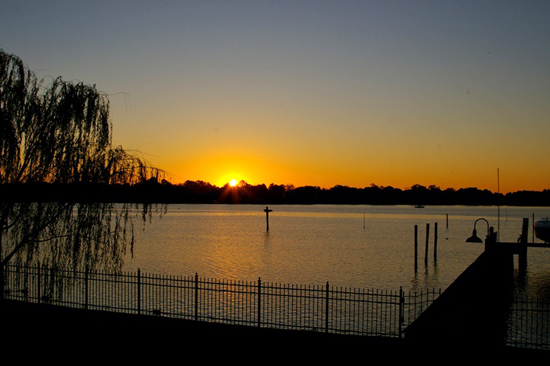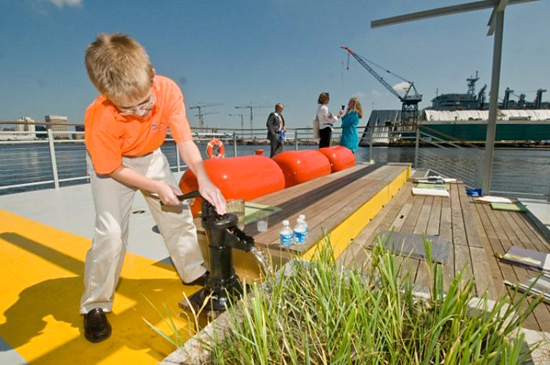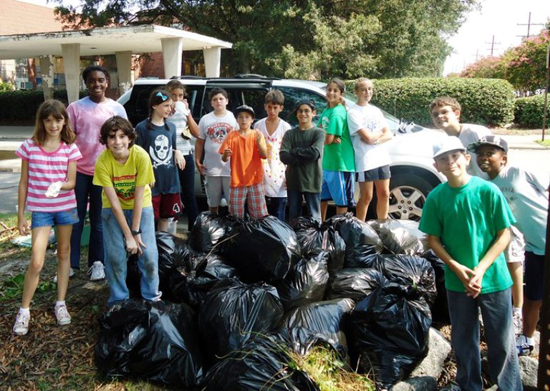Watershed Wednesday: Elizabeth River Project (Portsmouth, Virginia)
The Elizabeth River Project's goal is to make the river safe for swimming and eating oysters by 2020.
The Elizabeth River, a 6-mile-long tributary of the James River in southeastern Virginia, was named after Princess Elizabeth Stuart. She was the daughter of England's King James I, Jamestown's namesake.
Today, Princess Elizabeth is still around – yes, you heard us right! She often speaks to students in the Hampton Roads community about how people can help restore her river to the way it looked when Captain John Smith first explored it in 1607. The princess's public speaking appointments are arranged by the Elizabeth River Project, a non-profit committed to improving the health of the Elizabeth River through restoration efforts and education programs that celebrate the river's history and natural resources.

(Image courtesy beachgirlvb/Flickr)
Royal advocacy is one of many ways the Elizabeth River Project is achieving its goal of making the river safe for swimming and eating oysters by 2020. Here are some of the Elizabeth River Project's other inspiring programs.
Learning by doing: The Learning Barge
You may have heard that saying, "Those that can't do, teach." But like the many excellent teachers out there, the Elizabeth River Project proves this old adage wrong with its wind-powered, solar-powered, floating environmental classroom, The Learning Barge.
The objective of The Learning Barge is not only to teach visitors how they can help restore the Elizabeth River, but to exemplify these actions on the barge itself. Live floating wetlands demonstrate how these habitats absorb polluted stormwater runoff, composting toilets offer an alternative to flushing, and a rainwater system collects water to reuse. Visitors to this “green barge” can see firsthand how these actions help improve the Elizabeth River’s health.
The Learning Barge's innovation has earned it the 2011 Sea World & Busch Gardens Environmental Excellence Award, which is presented to outstanding grassroots environmental education programs across the country.

(Image courtesy Elizabeth River Project/Facebook)
Since 2009, more than 10,000 students have visited the floating classroom. This year, up to 60 students can set to sea at once on the barge. Three new stations (sun, wind and rain) focus on renewable energy technology.
The barge's field trip education programs were designed by local educators to meet Virginia standards for most subjects (not just science). The Elizabeth River Project even provides pre-and post-field trip activities, including art projects (sending a message in a bottle), journaling exercises (writing a letter to Princess Elizabeth) and more.
Baby, you're a star! (A River Star, that is!)
The Elizabeth River Project also gets adults involved in stewardship efforts through its River Star brand, a certification that home and business owners can earn after they take seven easy river-friendly steps. Some of the steps are so easy that they actually require you not to do something (such as not feeding geese, not flushing medicines and not dumping grease down the sink). Take a peek at this short video to see some River Stars in action.
The River Star certification is also applied to schools. There are already 128 River Star schools – more than half of the total 200 public and private schools in the Elizabeth River watershed. Students at River Star schools create herb and butterfly gardens, plant marsh grasses, learn how to compost and more.

(Image courtesy Elizabeth River Project/Facebook)
Although the River Star certification is available only to Hampton Roads area residents, the seven easy steps are a great idea for anyone to try.
The Elizabeth River Project offers even more creative ways to help and enjoy the river:
- Adopt a wetland or simply participate in a one-day cleanup. Many sites in Norfolk, Portsmouth and Chesapeake are in need of weeding, planting and litter cleanup. These visits also provide a great service-learning opportunity.
- Visit Paradise Creek Park, slated to open later this year. The area surrounding Paradise Creek – an Elizabeth River tributary – was once nicknamed "Paradise Lost" because of its close proximity to the former New Gosport landfill, a Superfund site. Now the creek has become a model for urban waterway restoration. The park will provide the public with access to the Elizabeth River for boating, hiking and other outdoor activities.

Comments
There are no comments.
Thank you!
Your comment has been received. Before it can be published, the comment will be reviewed by our team to ensure it adheres with our rules of engagement.
Back to recent stories